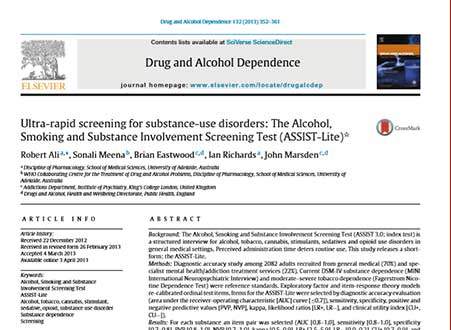The ASSIST and the ASSIST-Lite are available in electronic format. The eASSIST and the eASSIST-Lite are web based versions that can be used on a personal computer.The ASSIST Checkup and ASSIST Checkup Lite are downloadable apps for completion on any smartphone or tablet.
 Resources & Tools
Resources & Tools
Download a full range of ASSIST and ASSIST-Lite tools and resources.
EXPLORE ALL RESOURCES Instructional videos
Instructional videos
The instructional videos demonstrate how to administer the ASSIST and ASSIST-Lite in a range of settings.
WATCH ALL VIDEOS Bibliography
Bibliography
Find a list of over 400 articles on the ASSIST and ASSIST-Lite.
DOWNLOAD BIBLIOGRAPHYRegister to complete the ASSIST eLearning package. You can also join the ASSIST Community to connect with experts and network with other members. Once registered, you can keep up to date with the latest news and conference presentations.

New Resource for Older Persons: ASSIST-Lite Screening Tool Now Available!
Substance use issues among older adults often go undetected, yet they represent a growing concern that can significantly impact health outcomes and quality of life. Starting these conversations with older clients is crucial for prevention and intervention.
We're pleased to announce that the ASSIST-Lite form is now available on our portal—a specialised screening tool designed specifically for identifying alcohol and other drug problems in older populations. This streamlined resource features the structured ASSIST-Lite questionnaire to assess risk levels, followed by a brief intervention guide on the second page that helps you connect assessment findings with meaningful discussions about potential harms and next steps.
This tool can be used to empower healthcare providers to address substance use concerns with confidence, and ensure that older adults receive the support they need before problems escalate.
The updated form is available to download here and can be accessed/downloaded anytime by visiting our Portal at https://www.assistportal.com.au/resources/
09-24-2025

|
Risk Level |
ASSIST Score |
Recommended Action |
|
Low |
0–10 for alcohol 0–3 for other substances |
Brief feedback current use and possible future risk |
|
Moderate |
11–26 for alcohol 4–26 for other substances |
Brief intervention using a motivational interviewing approach |
|
High |
27+ for any substance |
Referral to your specialist service for detailed assessment and treatment |
09-24-2025

04-08-2025

04-08-2025

04-08-2025

The ASSIST Program provides training, technical advice and support to people interested in Alcohol, Smoking and Substance Involvement Screening.

Join the ASSIST Community in discussions, eLearning and activities related to the eASSIST and managing addiction.
VIEW DETAILSAre you concerned about your own or someone else’s alcohol or other drug use? Call the National Alcohol and Other Drug Hotline for free and confidential advice about alcohol and other drugs.
24 hour support line: 1800 250 015
The ASSIST Program team acknowledges the Traditional Owners of the lands and waters of Australia and the Torres Strait. We respect all Aboriginal and Torres Strait Islander people—their customs and their beliefs. We also pay our respects to Elders past and present, with particular acknowledgement to the Kaurna people, the original custodians of the Adelaide Plains and the land on which the University of Adelaide's campuses at North Terrace, Waite, Thebarton and Roseworthy are built.
Aboriginal and Torres Strait Islander people should be aware that this website may contain images, voices and names of people who have passed away.